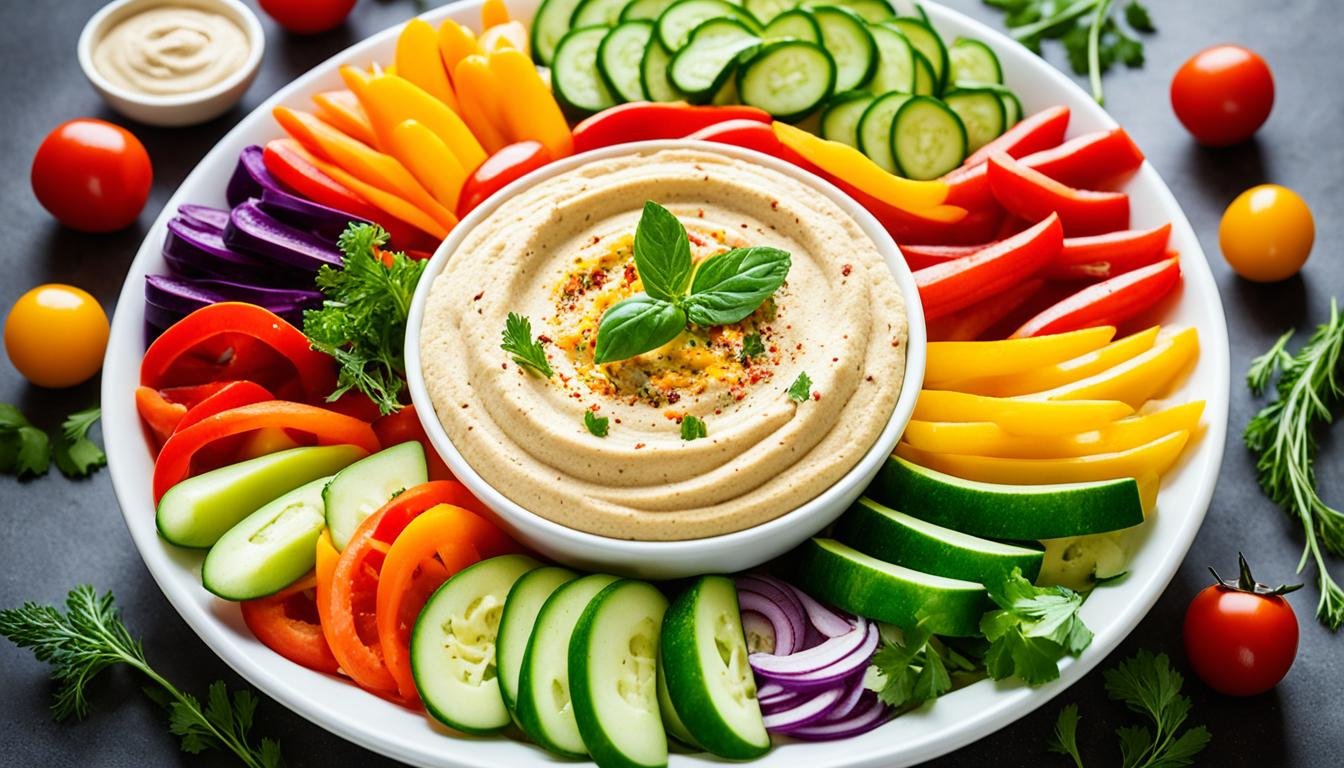Get our FREE E-Book HERE - 120 TIPS for Losing Weight & Bonus Tips for Postpartum Weight Loss & Dad’s Postpartum Experience
Is Hummus Good for Weight Loss: Yay or Nay?

Are you looking for a delicious and healthy way to shed those extra pounds? Well, you may be surprised to learn that the answer could be found in a creamy spread known as hummus. Yes, that’s right – hummus, the Middle Eastern delicacy made from chickpeas, tahini, garlic, and lemon juice. But is it really good for weight loss?
Many people have heard of hummus and its many health benefits, but they may be skeptical about its role in a weight loss diet. After all, isn’t hummus high in calories and fat? How can something so creamy and indulgent actually help you lose weight?
In this article, we will search the truth behind hummus and its impact on weight loss. We will explore its nutritional composition, the role of protein and fiber in satiety, and how to incorporate hummus into a weight-loss diet. Prepare to have your taste buds tantalized and your misconceptions shattered!
Key Takeaways:
- Hummus is a creamy spread made from chickpeas, tahini, garlic, and lemon juice.
- Studies have shown that adults who consume hummus are less likely to be obese or overweight.
- Protein and fiber in hummus contribute to feelings of fullness and satiety, making it a beneficial addition to a weight loss diet.
- To optimize hummus for weight loss, pair it with healthy dipping options like vegetables and practice portion control.
- By incorporating hummus into a well-rounded diet, you can enjoy the benefits of this nutritious food while shedding pounds.
Understanding Hummus: Composition and Nutritional Value
When it comes to exploring the world of delicious spreads, hummus is a star player. Let’s dive deeper into the composition and nutritional value of this versatile dip.
What is Hummus Made Of?
Hummus is the result of blending a few simple ingredients to create a creamy and satisfying spread. The base of hummus is made from cooked chickpeas, providing a good source of plant-based protein and dietary fiber. This combination gives hummus its signature thickness and texture.
To enhance the flavor, tahini is added to the mix. Tahini is a paste made from sesame seeds, bringing a nutty and rich taste to the hummus. Garlic and lemon juice are then incorporated to add a vibrant and tangy kick. These classic ingredients work together harmoniously, creating a well-balanced and irresistible flavor profile.
Nutritional Breakdown of Hummus
The nutritional value of hummus can vary depending on whether it is store-bought or homemade. On average, hummus contains around 237 calories per 100 grams. While this may seem high, it’s important to note that hummus is also packed with beneficial nutrients.
One of the standout components of hummus is its protein content. Chickpeas and tahini both contribute to the protein content, making hummus a valuable source of plant-based protein. Additionally, hummus contains dietary fiber, which aids in digestion and promotes a feeling of fullness.
Hummus Variations Around the World
While traditional hummus is delicious on its own, it’s worth exploring the world of hummus variations. Different countries and cultures have put their own twist on this beloved dip, resulting in a range of delightful flavors.
In some variations, herbs and spices like parsley, cumin, or paprika are added to enhance the taste and aroma. These additions can take the flavor profile of hummus to a new level, providing a unique and exciting experience for your taste buds.
Is Hummus Good for Weight Loss?
Hummus can be a beneficial addition to your weight loss plan. It is rich in protein and fiber, which can contribute to feelings of fullness and satiety.

The healthy monounsaturated fats found in hummus can also support weight loss by regulating fat gene expression and promoting a healthy body composition.
The Journal of Nutrition & Food Sciences includes a 2014 study that confirmed our opinion: Adults who consumed humus were 53% less likely to be overweight or obese. Also, the study concluded that chickpea/hummus consumption was associated with better nutrient intake, diet quality and weight parameters in adults, and consumption should be encouraged.
Here are a few more interesting finds about people who eat chickpea dips:
- They consume 52% more fiber
- They consume 13% more good fats
- They consume 20% less sugar
- They generally eat fruits, vegetables, and healthy whole grains every day
- And the most important one that they have smaller waists
However, it’s important to consider portion sizes and overall calorie intake when including hummus in your weight loss diet. While hummus is a nutritious choice, it is still calorie-dense, so it’s important to consume it in moderation.
This section will delve deeper into the potential benefits of hummus for weight loss, providing you with valuable information to help you make informed choices on your weight loss journey.
The Satiating Power of Protein and Fiber in Hummus
Hummus is not only a delicious spread, but it also offers a powerful combination of protein and fiber that can aid in weight loss and promote feelings of fullness. Protein plays a crucial role in regulating appetite and supporting weight control.
When you consume protein-rich foods like hummus, it triggers the release of hormones that send signals to your brain, signaling fullness and reducing the desire to eat more. This can help you stay satisfied for longer periods and potentially reduce your overall calorie intake.
Fiber, on the other hand, slows down the digestion process and contributes to satiety. It adds bulk to your meals, making you feel fuller without adding many calories. The fiber in hummus, predominantly found in chickpeas, helps to regulate your bowel movements, support digestive health, and keep you feeling satisfied throughout the day.
Moreover, hummus is a great choice for peoples with diabetes or those aiming to maintain stable blood sugar levels. Unlike some high-carbohydrate foods, hummus has a low glycemic index, meaning it doesn’t cause significant spikes in blood sugar levels. This can be particularly beneficial for individuals who need to manage their insulin and glucose levels effectively.
By incorporating protein-rich and fiber-packed hummus into your diet, you can experience the satiating power these nutrients offer, helping you feel fuller for longer and potentially supporting your weight loss efforts. Whether you enjoy it as a snack or as part of a meal, hummus can be an excellent addition to a balanced and nutritious eating plan.
Hummus in Your Diet: How to Optimize for Weight Loss
To optimize hummus for weight loss, it’s important to make smart choices when pairing it with other foods. Instead of processed snacks like crackers or chips, opt for healthier options like sliced vegetables. These provide additional nutrients and contribute to a more balanced diet.
You can enjoy the goodness of hummus by incorporating it into meals to add flavor and nutrition. Use it as a salad dressing, or as a spread in sandwiches or wraps. This way, you not only enhance the taste but also benefit from the protein and fiber content in hummus.
Portion control is key when enjoying hummus while trying to lose weight, as it is still calorie-dense. By practicing portion control, you can keep track of your calorie intake and avoid overeating. Remember that moderation is key when it comes to any food, including hummus.

This section has provided some tips and ideas for maximizing the weight loss potential of hummus in your diet. By making healthier dipping choices, incorporating hummus into meals, and practicing portion control, you can enjoy the benefits of this delicious and nutritious food while shedding pounds.
Conclusion
In conclusion, incorporating hummus into your weight loss diet can be a smart and delicious choice. With its composition of protein, fiber, and healthy fats, hummus provides satiety and supports balanced blood sugar levels. Whether enjoyed as a versatile snack or as a component of a meal, hummus offers a nutritious option that can help you shed pounds.
However, it’s important to keep in mind that portion control and overall calorie intake are key factors in achieving your weight loss goals effectively. While hummus is packed with nutrients, it is still calorie-dense, so it’s essential to enjoy it in moderation. By making smart choices and pairing hummus with sliced vegetables instead of processed snacks, you can optimize its weight loss potential and contribute to a more balanced diet.
So, go ahead and enjoy the benefits of hummus in your weight loss journey. Customize your own homemade hummus to reduce calories and increase omega-3 fatty acid content. Explore the various hummus variations from around the world to add a touch of flavor and diversity to your meals. Remember, with the right choices and a well-rounded diet, hummus can be your go-to companion in achieving your weight loss goals!
FAQ
Is hummus good for weight loss?
Is hummus good for diabetics?
Is hummus healthy?
What is hummus made of?
What is the nutritional breakdown of hummus?
What are some popular hummus variations around the world?
What are the potential benefits of hummus for weight loss?
What is the role of protein in fullness and weight control?
How does dietary fiber impact digestion and satiety?
Does hummus disturb insulin levels?
What are some healthier dipping options for hummus?
How can hummus be incorporated into meals for balanced nutrition?
What is the key to enjoying hummus while shedding pounds?
Source Links
- https://www.eatingwell.com/article/8021027/best-snack-for-weight-loss/
- https://familydoctorsmc.com/what-to-eat-with-hummus-for-weight-loss/
- https://hurrythefoodup.com/is-hummus-good-for-you-weight-loss/
- https://www.longdom.org/abstract/chickpeas-and-hummus-are-associated-with-better-nutrient-intake-diet-quality-and-levels-of-some-cardiovascular-risk-fact-33525.html








